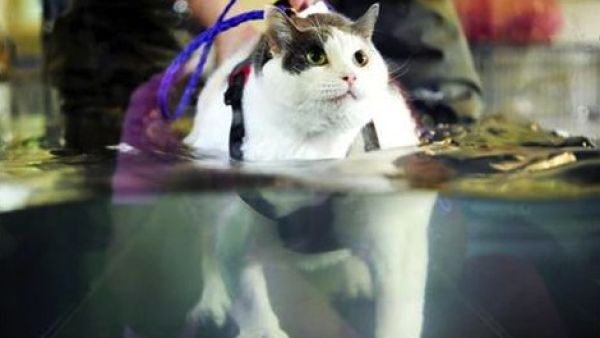Burgers, pizzas, chips and ice cream - a dodgy diet that's certain to make any belly bulge. Now just imagine that's your dog's dinner.
“We even had a woman who was feeding her dog spicy burritos, and was surprised about why it had diarrhoea,” says Sabrina Walle, practice manager at Petzone Veterinary Clinic in Dubai. A year ago the centre started an obesity clinic for pudgy pooches and flabby felines. As far as Walle knows, it’s the only animal obesity clinic in Dubai. So far, 100 dogs have benefited from its tummy-trimming tips - including Indian national Ursula Manvatkar’s seven-year-old border collie, Ruby.
Last summer, Ruby’s weight had ballooned to 45kg. But it wasn’t burgers, pizzas, chips and ice cream that were Ruby’s problem - she was being fed on standard dog food. With an incredible 13 pets - seven cats and six dogs - to look after, baffled animal lover Manvatkar went to remarkable lengths to uncover reasons for Ruby’s excess weight.
She set up a video camera and was astonished to see ravenous Ruby bullying the other dogs aside and eating all their meals as well as her own. Manvatkar said: “We couldn’t believe it.”
Walle wishes Ruby was the heaviest dog she’s come across in her work. Yet she remembers the day when an 80kg mixed-breed Bernese mountain dog waddled through the door - almost double the weight it should have been. There was also the pug belonging to a “Paris Hilton-esque” owner who carried her dog everywhere.
“From the car to the house to the shops, it wasn’t walking at all,” says Walle. The pug topped the scales at 16kg - when its healthy weight should have been somewhere between 6kg and 9kg. The practice manager says she’s never seen a dog die directly from obesity, but the problems associated with being so overweight are dangerous. It’s the organs - heart, liver, kidneys - that bear the brunt of the bulge, says Walle, with breathing problems also an issue.
She admits that keeping dogs trim and toned in Dubai can be difficult compared to other cities, with many residents living in apartments, while the hot weather can mean outdoor walks are limited. However, the clinic is helping to monitor podgy pets and give their owners tips.
Walle says it’s important not to try to reduce weight too fast. She suggests some tips to ensure the dog gets exercise - even simple tricks such as moving the food bowl away from the bed so that the pooch has to walk to eat - or using a special “slow-down bowl” to make sure the dog chews rather than wolfs its food.
“And make sure you feed them dog food, not human food,” Walle adds. After a lot of hard work, Manvatkar’s dog Ruby shed a huge amount of weight – she now tips the scales at a much more manageable 19kg.
“It can be done,” says Walle.








